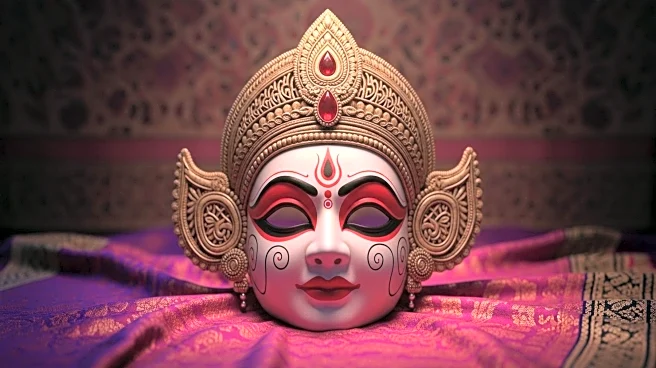What is the story about?
What's Happening?
Ayushmann Khurrana is preparing for the release of his upcoming horror comedy film 'Thamma', which he describes as a unique blend of Indian folklore and modern storytelling. The film, co-starring Rashmika Mandanna, features Khurrana as a character inspired by the Betaal from the iconic show 'Vikram Betaal'. In an interview, Khurrana shared his childhood memories of watching 'Vikram Betaal' and expressed excitement about portraying a Betaal with superpowers. 'Thamma' is positioned as the first love story within the horror comedy genre, promising a fresh cinematic experience for audiences.
Why It's Important?
The release of 'Thamma' signifies a creative exploration of Indian folklore within contemporary cinema, potentially attracting audiences interested in cultural narratives and supernatural themes. Ayushmann Khurrana's involvement adds star power and credibility to the project, likely increasing its appeal. The film's unique premise could contribute to diversifying the horror comedy genre in India, offering audiences a novel storytelling approach. Additionally, the film's release during Diwali may enhance its visibility and box office performance, capitalizing on the festive season's increased movie-going activity.
What's Next?
As 'Thamma' approaches its theatrical release on October 21, promotional activities are expected to intensify, with potential interviews, trailers, and marketing campaigns aimed at building anticipation. The film's performance could influence future projects within the horror comedy genre, encouraging filmmakers to explore similar themes. Audience reception will be crucial in determining the film's success and its impact on Ayushmann Khurrana's career trajectory. The film's unique blend of folklore and modern elements may also inspire discussions on cultural representation in Indian cinema.
Beyond the Headlines
The integration of folklore into mainstream cinema raises questions about cultural preservation and adaptation. 'Thamma' could spark conversations on how traditional narratives can be reimagined for contemporary audiences, balancing authenticity with innovation. The film's approach may also influence how Indian filmmakers incorporate cultural elements into their storytelling, potentially leading to a broader acceptance of diverse narratives in the industry.

















